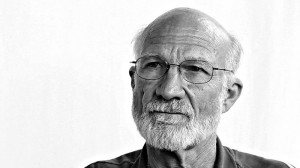Joseph W.H. Lough
A quarter century ago I recall reading an essay by Stanley Hauerwas, a midrash on the novel Watership Down, in my Ethics class at Pacific School of Religion, where I was attending seminary. Since then he has gone on to establish himself at the top of the world of Ethics more generally, evidenced by the appearance this week of of excerpts from an interview probing Professor Hauerwas on US intervention in the Syrian conflict, published in Atlantic Monthly (http://www.theatlantic.com/national/archive/2013/09/what-makes-america-so-prone-to-intervention/279393/)
One can only lament at not having the entire interview; or not having access to Professor Hauerwas’ full argument. For out of the piece published in Atlantic Monthly it is difficult to make heads or tails. The interview begins promisingly enough with a not-too-well-veiled invocation of Pericles’ Memorial Speech, which all students will remember from Thucydides’ Peloponnesian War. There, Pericles (or Thucydides) establishes the basic outline for every memorial day speech since, reminding his listeners of those whose lives have already be sacrificed in making Athens a great power and pleading with them not to allow the lives of the dead to have been sacrificed in vain. Pericles then goes on to invite the grieving mothers, wives, and sisters of Athens to put aside their grief and to commit themselves to raising up future generations of children for the glory and honor of self-sacrifice.
Thus, in the Atlantic Monthly piece Hauerwas notes how “war serves as the great liturgical event for Americans, where we sacrifice the youth of the present generation to show that the sacrifices of the youth of the past generations were worthy. So war becomes the great ritual moral renewal of the American society.” Hauerwas’ debt to the classics does not end with Thucydides. Later in the interview, Professor Hauerwas also invokes Aristotle, whose republican ethics once lay at the foundation of every Atlantic seaboard republic, including the United States, since it offered a rigorous refutation of mere utilitarian ethics.
Thus, when asked to esteem the merits of altruistic versus selfish reasons for going to war, Hauerwas dismisses the very distinction as spurious. “The construction of altruism vs. selfishness – Aristotle knew nothing of that. He thought your first obligation was to be your own best friend. And if you are a good person, therefore, you are to follow your own interests because they are for the good.” There is not one ethics that is right for the individual and another that is right for the community. Those individuals who enjoy integrity appreciate why my good is intimately connected to the good of those around me and why I can answer the question “What is good?” only by acting on a principle upon which each and every person independently would also have to act.
These displays of brilliant insight make even this short excerpt worth reading. And, yet, I am forced to conclude that there must have been much else that was edited out of the published version. For if Americans today are merely repeating the same ritual liturgical rationale for war that Pericles developed two and a half millennia ago, then it would hardly seem a sufficient explanation to differentiate contemporary Americans from fourth century BCE Athenians or, for that matter, to differentiate them from contemporary Frenchmen, Germans, or Italians. Why might we be so ready to embrace this liturgy while others are less so?
Perhaps it is here that Professor Hauerwas’ approach lets him down. For in order to answer this question – and so answer the question with which the interview is titled – we would have to determine what differentiates contemporary Americans from their predecessors or from their non-American contemporaries. And while the answer is too complex to tackle in a short blog, two differences do stand out.
First, contemporary Americans differ from non-Americans insofar as America’s political system is explicitly and perhaps deliberately plutocratic. It was plutocratic before Citizens United, but it has now received legal cover from the highest court in the land. In America, money not individuals vote. Second, while the framers of the US Constitution unquestionably aimed at a republic of virtue, a political culture grounded in Aristotle’s Politics, it was not long (1790s at the latest) before this principle of virtue was compelled to bow to the principle of pure numbers: democracy absent the institutional and substantive foundations necessary to make democracy work.
America is so prone to intervention because it has embraced a modern version of the same Periclean democracy that hypnotized fourth century Athens; democracy without the institutional and substantive conditions necessary to make it work. But this means that those who have short-term financial interests – and not least the industrial military complex itself – are easily able to bend public opinion to their own short-term ends; and are able to do so easily because money now legally enjoys the largest vote by far.
In order to reground America on republican principles, we will first need to work vigorously to isolate the interests of capital from res publica, from the wealth we hold in common. Brilliantly, Professor Hauerwas invites us to explore this confusion of public and private interests not along utilitarian lines, but along lines of an ethics of responsibility.
